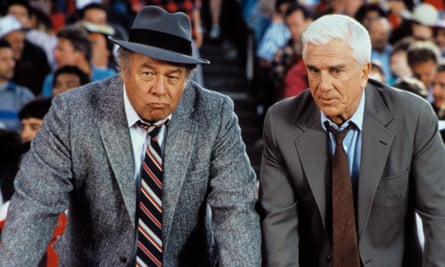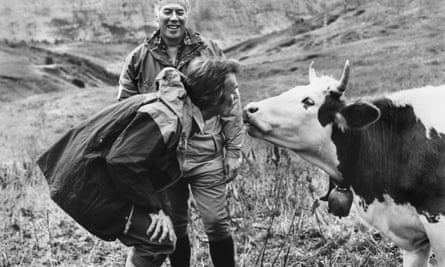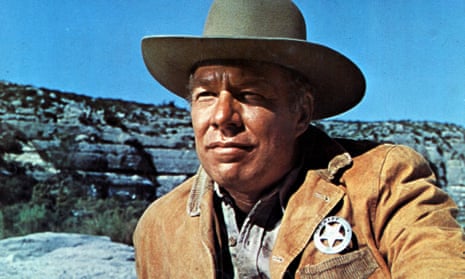George Kennedy, who has died aged 91, was known mainly for three movie roles, each of which represented a different aspect of his career: as heavy, hero and clown. They were the bullying convict Dragline in Cool Hand Luke (1967) – for which he won the Oscar for best supporting actor – aviation expert Joe Patroni in the Airport series of disaster movies from the 1970s, and Captain Ed Hocken, the none-too-bright sidekick of bumbling cop Frank Drebin (Leslie Nielsen) in the spoof Naked Gun trilogy (1988-94).
In the early to mid-60s, the tall, bulky Kennedy (he was 6ft 4in) appeared as bad guys in dozens of TV western series such as Rawhide, Gunsmoke and Bonanza. In films, he continued in the same vein, as the sadistic jailhouse guard who beats up Kirk Douglas in Lonely Are the Brave (1962); the one-armed hitman who chases Cary Grant over the Paris rooftops in Charade (1963); and the menacing hired gunfighter – “I don’t care what I have to do, as long as I get my money” – in The Sons of Katie Elder (1965). In the latter, John Wayne slams a piece of wood into Kennedy’s face.
In Cool Hand Luke, Kennedy as Dragline challenges his fellow convict Luke (Paul Newman) to a boxing match. The fight goes on and on, as Luke goes down again and again against the massive Dragline, only to rise once more. But Kennedy makes Dragline no one-dimensional “behind bars” brute. He comes to admire his adversary. “That’s my darlin’ Luke. He grins like a baby, but he bites like a gator.”
Thereafter, Kennedy began to play more sympathetic tough guys. He was the detective leading the search for The Boston Strangler (1968); he joins up with Robert Mitchum to defeat outlaws in Bandolero! (1968) and he took over Yul Brynner’s role as Chris, the legendary gunman, in Guns of the Magnificent Seven (1969), the second sequel to The Magnificent Seven. Kennedy also began to show a comic side in several comedy westerns including The Good Guys and the Bad Guys (1969).
But it was when disaster struck that Kennedy really made a name for himself. He profited from the heyday of the disaster movie, a sub-genre instigated by Airport. Kennedy, the only actor to appear in all four of the Airport films (1970, 1975, 1977 and 1979), was perfect as the cigar-chomping troubleshooter Patroni, on whom everybody relies. “Who do ya think you’re talking to, some kid that fixes bicycles? I know every inch of the 707! Take the wings off this and you could use it as a TANK! This plane is built to withstand anything... except a bad pilot,” he yells at one stage. He was also the put-upon cop in Earthquake (1974) who comes to the conclusion that “earthquakes bring out the worst in some people”.

Kennedy was born in New York City into a show business family. His father, George Sr, was a musician and orchestra leader, and died when Kennedy was four years old. He was raised by his mother, Helen (nee Kieselbach), a ballet dancer.
Kennedy made his stage debut at the age of two in a touring production of Bringing Up Father, based on the popular cartoon strip, and by seven he was a radio disc jockey in New York. During the second world war, he enlisted, aged 20, in the army, where he served under General George Patton, whom he later portrayed in Brass Target (1979). He remained a soldier for 16 years, returning to entertainment as military consultant to Bilko and company on The Phil Silvers Show in 1955. Kennedy continued to alternate his work in TV with his film roles throughout his career.

His most widely known TV part was as Carter McKay, the red-faced, sweaty and loud-mouthed rancher and head of West Star oil and the main rival of JR in Dallas (1988-91). He also got a chance to lampoon his big lug persona in The Naked Gun: From the Files of Police Squad! (1988), The Naked Gun 2 ½: The Smell of Fear (1991) and The Naked Gun 33⅓: The Final Insult (1994). While OJ Simpson as Nordberg did much of the slapstick, Kennedy as Ed was the ideal stooge to Nielsen’s Frank Drebin. Frank: “I wonder why Savage would be hanging out in a place like that?” Ed: “Sex Frank?” Frank: “Er... Thanks. Not right now, Ed.”
Kennedy, whose dependence on a hearing aid did not prevent his working into his 80s, was married four times – twice to the same woman, Revel Wurman, with whom he had two children. His third wife, Joan McCarthy, died last year. Together they adopted four children. He is survived by his children and grandchildren.

Comments (…)
Sign in or create your Guardian account to join the discussion